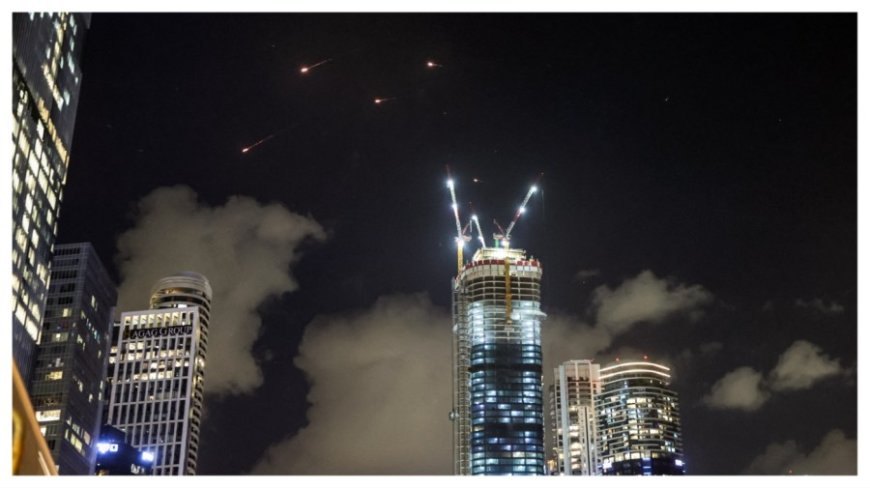Iran attacks ratchet up Middle East conflict: 5 takeaways
The Middle East is a powder keg after Iran launched nearly 200 missiles toward Israel Wednesday, with the United States vowing "severe consequences" for the action. No deaths in Israel were immediately assessed, and U.S. officials said the missiles — aimed at Israel and U.S. Navy ships participating in repelling the attack — were largely shot...

The Middle East is a powder keg after Iran launched nearly 200 missiles toward Israel Wednesday, with the United States vowing "severe consequences" for the action.
No deaths in Israel were immediately assessed, and U.S. officials said the missiles — aimed at Israel and U.S. Navy ships participating in repelling the attack — were largely shot down. White House national security adviser Jake Sullivan said the blitz "appears to have been defeated and ineffective."
The Iranian strikes, which come amid Israel's ongoing war against Hamas in Gaza, follow a nearly yearlong conflict between Israeli forces and Hezbollah in Lebanon, a main proxy of Tehran. Both sides have traded cross-border strikes — Hezbollah in support of its fellow proxy Hamas and Israel to clear the way for displaced settlers to return to the border area.
But Israel drew the ire of Iran after it ramped up airstrikes across Lebanon in the past few weeks, eliminating most of Hezbollah's command structure, including its leader Hassan Nasrallah.
Tehran responded with Tuesday's airstrikes, which Sullivan called a "significant escalation," and he said the U.S. will work with Israel to ensure Iran faces "severe consequences."
Here are five takeaways:
Iran attacks
The Iranian attacks were highly anticipated Monday evening and into Tuesday morning, with the White House warning that such strikes were imminent.
Then, around 7:30 p.m. local time in Israel, Iran was assessed to have launched missiles with sirens sounding across Israel, according to the Israeli military.
Israel "was able to intercept the majority of the incoming missiles," with two U.S. naval destroyer ships firing around a dozen interceptors to assist, according to Pentagon press secretary Maj. Gen. Pat Ryder, who also said there was "minimal damage on the ground" in Israel. Several people were reported injured, but they did not include American troops.
State Department spokesperson Matthew Miller later said U.S. partners assisted Israel and Washington in helping quell the attack. He declined to reveal the countries, telling reporters he'll let them speak for themselves.
Miller also denied reports that Tehran had alerted Washington of their attack shortly before it was launched.
The attack was over quickly, with the Iranian mission to the U.N. indicating on the social platform X shortly after 8 p.m. that it had finished.
"Iran's legal, rational, and legitimate response to the terrorist acts of the Zionist regime — which involved targeting Iranian nationals and interests and infringing upon the national sovereignty of the Islamic Republic of Iran — has been duly carried out," according to the post from Tehran, which warned that any "further acts of malevolence" from Israel would warrant "a subsequent and crushing response."
Tehran last launched major strikes against Israel in April, shooting about 300 drones and missiles at the country. That assault also was largely shot down by Israeli defense systems with the help of the U.S. and its allies.
Israel vows revenge
Shortly after the attack ended, Israel vowed retribution, with Israel Defense Forces spokesperson Rear Adm. Daniel Hagari declaring that the "attack will have consequences."
"We have plans. We will act at the time and place of our choosing," Hagari said in a public video statement.
Israeli Prime Minister Benjamin Netanyahu later said Iran "will pay" for the missiles launched at his country.
"This evening, Iran made a big mistake — and it will pay for it," Netanyahu said during a security Cabinet meeting. "The regime in Tehran does not understand our determination to defend ourselves and to exact a price from our enemies."
And Israel's former Prime Minister Naftali Bennett said his country should quickly attack Iran's nuclear program to wipe out Tehran's "terrible threat" to the Middle East.
Israel "has now its greatest opportunity in 50 years to change the face" of the Middle East, he said, pressing Netanyahu to hit Iran's energy facilities to "strike the head of the octopus of terror" while the "octopus's tentacles are temporarily paralyzed."
Israel has already begun limited ground operations in Lebanon in search of Hezbollah's top leaders. In his speech, Netanyahu promised to pursue all of Israel's enemies.
"Israel has the momentum and the axis of evil is in retreat. We will do whatever needs to be done to continue this trend," he said.
U.S. response
The United States appeared eager to tamp down regional tensions following the attack, even as it stressed that Iran's actions warranted "severe consequences."
"Obviously, this is a significant escalation by Iran, a significant event, and it is equally significant that we were able to step up with Israel and create a situation in which no one was killed in this attack in Israel, so far as we know at this time," Sullivan told reporters.
"We are now going to look at what the appropriate next steps are to secure first and foremost American interests, and then to promote stability to the maximum extent possible as we go forward," he added.
President Biden reiterated Sullivan's comments, attributing the "defeated and ineffective" attack to Israeli military capability, the U.S. military and "intensive planning" between Washington and Israel — stressing his administration's unwavering support for its ally.
Vice President Harris, who monitored the strike developments from the White House Situation Room with Biden, condemned the attack "unequivocally" and called it "reckless and brazen."
She also pledged always to ensure Israel can defend itself and that her "commitment to the security of Israel is unwavering."
Outside the administration, U.S. lawmakers called for a swift response, including Sen. Lindsey Graham (R-S.C.).
"This missile attack against Israel should be the breaking point, and I would urge the Biden Administration to coordinate an overwhelming response with Israel, starting with Iran's ability to refine oil," Graham said in a statement.
And Rep. Jared Moskowitz (D-Fla.) wrote on X that Iran "made a mistake" and that it "has put its nuclear facilities on the board as fair game."
Trumps rips Biden and Harris
Former President Trump quickly took to social media to blame the Biden administration for the attacks, claiming it would not have happened on his watch.
"Look at the World today — Look at the missiles flying right now in the Middle East, look at what's happening with Russia/Ukraine, look at Inflation destroying the World. NONE OF THIS HAPPENED WHILE I WAS PRESIDENT!" he wrote in a post on Truth Social.
In a statement released shortly thereafter, he lambasted Biden and Harris for what he referred to as a lack of leadership and claimed that when he was in the White House, "Iran was in total check."
"The World is on fire and spiraling out of control," Trump said. "We have a non-existent President in Joe Biden, and a completely absent Vice President, Kamala Harris, who is too busy fundraising in San Francisco, a City which she and Gavin Newscum totally destroyed, and staging fake photo ops."
Harris was in Washington at the time of the attack and had no campaign events scheduled on Tuesday.
Later, while speaking at a campaign event in Waunakee, Wis., Trump repeated his doomsday language.
"I've been talking about World War III for a long time, and I don't want to make predictions because they always come true, but they are very close to global catastrophe," he said.
He later said the Iranian attack happened because other nations "don't respect our country anymore," using an often repeated line of attack on Biden and Harris, claiming the pair are weak on foreign policy and suggesting that has led to more world conflict.
Cease-fire talks in tatters
The Biden administration may be hard-pressed to now broker a cease-fire between Israel and Hamas in Gaza and a cease-fire between Israel and Hezbollah in Lebanon in the wake of Tuesday's events.
Washington, which has for months attempted to have Israel and Hamas reach agreements to end the devastating war in Gaza, last week was unsuccessful in a scramble to secure a deal between Israel and Hezbollah to stop fighting.
At the time, Secretary of State Antony Blinken warned that diplomacy was the best option to "avoid a full-blown war" in the region.
But Israel has instead ignored the U.S. efforts and pressed forward, aware it has Hezbollah on the back foot in wiping out much of its leadership.
Barring the conflict soon coming to an end via diplomacy, the U.S. military has positioned a large amount of assets in the Middle East, including an aircraft carrier strike group, a guided-missile submarine, additional Navy ships and fighter jets. On Monday, the Pentagon announced it was sending even more troops and aircraft to the region.
Several U.S. lawmakers, meanwhile, including Sen. Bernie Sanders (I-Vt.), still pushed for a cease-fire deal, arguing that for months, leaders in both Israel and Iran "have chosen to escalate tensions rather than pursue diplomatic solutions."
"They have pushed us to the brink of a wider and more disastrous war. The U.S. must now forcefully demand an end to hostilities," he said in a statement. "A cease-fire for hostage deal remains the key to resolving the wider conflict. That could stop the escalatory cycle, end the bombing and the rocket attacks, and allow displaced people to return to their homes sooner."
What's Your Reaction?





















































